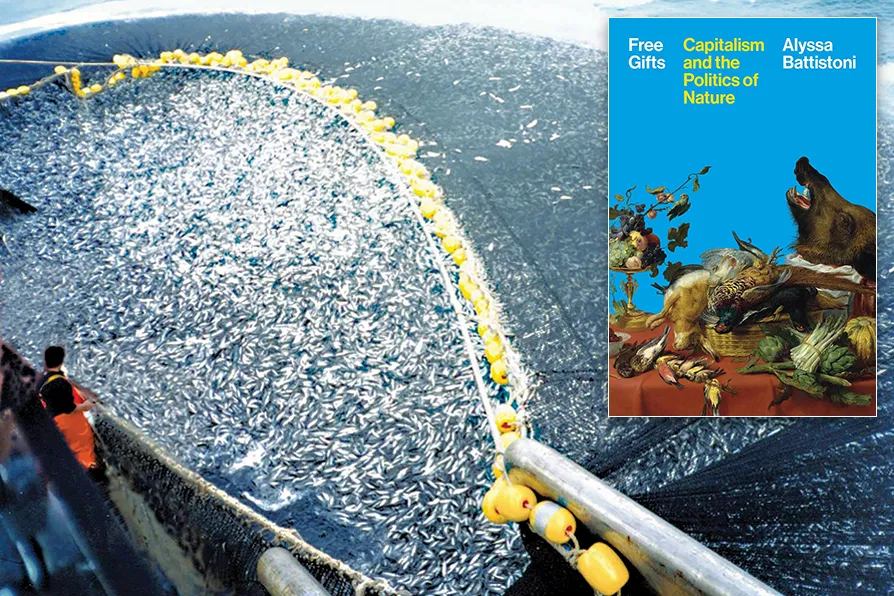SIMON PARSONS applauds an artist who rescues and rehumanises stories of women, the victims of violence, from a feminist perspective
If non-human nature is devoid of value under the capitalist mode of production, this book presents the case for its reintegration, suggests HENRY BELL

 UNTAMED GREED: A trawler reeling in a fishing net containing hundreds of thousands of cod fish, an example of overfishing [Pic: Asc1733/CCprogress]
UNTAMED GREED: A trawler reeling in a fishing net containing hundreds of thousands of cod fish, an example of overfishing [Pic: Asc1733/CCprogress]
Free Gifts: Capitalism and the Politics of Nature
Alyssa Battistoni, Princeton University Press, £30
IN her new book, Alyssa Battistoni unpacks one of the key ideological structures that has allowed the rapacious destruction of our planet by its rulers: the concept of “the free gifts of nature.”
The free gift is an idea inherited from classical economists which groups together the natural resources and forces that are essential for production, but not created by humans. Marx was critical of this idea, highlighting that such gifts were “free” only in the sense that the capitalist does not pay for them. Battistoni expands on Marx’s work to produce a thorough analysis of how this capitalist conception of the natural world continues to lead to the degradation of the worker and the earth. From natural resources to reproductive labour, Battestoni tries to liberate us from the relation to natural forces as a “free gift” ripe for exploitation.
The central idea of the book is that capitalism places nature outwith its own conception of worth, giving it neither price nor value. This system then obscures the unparalleled importance of nature. By mistakenly overlooking the value of the natural world, the mode of production that supposedly commodifies everything appears to have made a fatal oversight: “The idea that the end of the world might come about because of an accounting error tilts into absurdity” she writes.
Battistoni doesn’t find this to be a mistake, however. Instead she views it as the revelation of a contradiction: this system, based entirely on measures of value, fails to value the air and water that is essential to all human activity. Battistoni makes the case that this representation of nature as a free gift is foundational to capitalism and underpins a cultural, political and ideological system that, at its very centre, continues to degrade the natural world. By viewing nature as a “free gift” capitalism makes itself possible, and makes its destructive force inevitable.
By outlining the free gifts of nature as a capitalist social form she inverts the question of Marx’s capital — not how is human labour expressed as value, but how and why is non-human nature devoid of value under the capitalist mode of production. The book presents the deeply Marxist position that if the conception of nature as a free gift is an idea that has been made, so also can it be unmade.
The book posits that the category of the free gifts of nature needs to be disassembled so that our response to the climate crisis is not undermined by an ideological relationship between the human and non-human world. In pointing to the central economic questions of value, commodification and gifts, Battistoni is asking not just why has nature escaped such categorisation, but also how we can move past flawed measures of value and wealth that continue to lead us to disaster.
The worldview of the earth as a living being, of nature as alive, needs to be restored in order for us to fight capitalism. The world had to be deadened for capital to live. From this dead world capital is able to extract its “free gifts,” scything, hacking and extracting that which can be transformed from something essentially “valueless” into something of value. By restoring value to nature in the first place such destruction becomes less possible.
In a book that aims at liberating our conception of nature from the grips of capitalism, it is disappointing that the author posits only “post-capitalism” as the space in which different relational forms between human and non-human nature might emerge. Such a reliance on post-capitalism as a category leaves us with what Jodi Dean has described as a depoliticised and passive view of our economic future. This feels at odds with much of the energy of the book, which drives hopefully towards more liberatory ideals.
There would be much to gain from examining what we are able to assess about the social form that nature has taken under non-capitalist pasts, as well as from imagining it in a communist future. Similarly, while the book’s great strength is its presentation of capitalism’s categorisation of nature as something that diminishes our freedom, an elaboration of what this hoped-for freedom in relation to nature might mean, might clarify some of the text.
However, the book’s bold aim is to reintegrate nature into politics and economics and it is undoubtedly a powerful gesture in that direction. It is a valuable and generative addition to the burgeoning literature of Marxist ecology. In the most real sense it strives to restore the non-human world to its rightful place at the centre of human existence, and to imagine a place where humans have the freedom to value nature.










